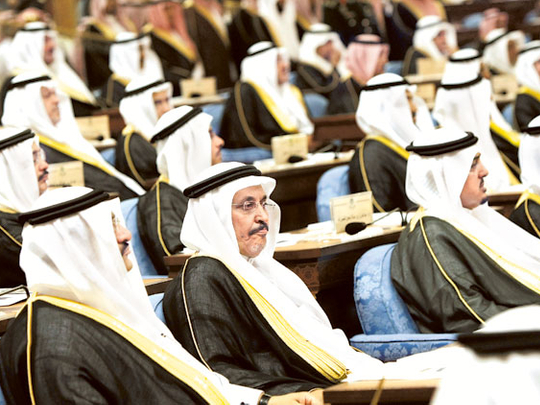
Manama: History was made in the men-only Saudi Shura when two women answered questions from the members in a face-to-face debate.
The breakthrough occurred on Sunday when Dr Muneera Bint Hamdan Al Aseemi, the health ministry assistant undersecretary for supporting medical services, and Dr Afaf Al Tuwaijeri, the head of training and scholarships at the ministry, used the podium to answer queries from the Shura members.
The two women were sitting at the parliament gallery following the three-hour debate on the floor between Dr Abdullah Al Rabeeah, the health minister, and the members. However, when the minister was asked a question related to Al Aseemi’s work, he referred it to her and she came down to take up the podium to answer the query. Al Tuwaijeri followed some time later when the minister again referred a question to her, local Arabic news site Sabq reported on Monday.
Responses from both women triggered warm appreciation from some Shura members, Sabq said.
“Their participation in the debate has made Shura members talk about a rehearsal for the involvement of women in face-to-face Shura debates in the near future,” a member was quoted as saying.
Al Aseemi, a 1984 nursing graduate who has authored books and given lectures in several countries, became in April the first Saudi woman to be appointed assistant undersecretary in the health ministry.
Al Tuwaijri was appointed head of training and scholarships in November 2010.
Although the Shura Council’s bylaws do not oppose the membership of women and do not specify the gender of the appointed members, it has had since it was founded in 1993 only male members.
The first council (1993–1997) had a speaker and 60 members and the second (1997–2001) had a speaker and 90 members. The third council (2001–2005) had a speaker and 120 members and the fourth (2005–2009) had a speaker plus 150 members.
Last year, King Abdullah Bin Abdul Aziz whose stances on reforms, particularly on women’s rights, have been obvious since he became ruler in August 2005, said that women would become members of the Consultative Council in the next term.
“We made this decision because we refuse to marginalise women in the Saudi society in their roles that comply with the Islamic Sharia and following consultations with many of our scholars who supported it,” King Abdullah said. “Muslim women in our history have had stances that cannot be sidelined, be it through views or advice, since the time of Prophet Mohammad [PBUH].”
According to the Saudi monarch, “balanced modernisation compatible with Islamic vales was a significant necessity.”
“It is our right to receive your opinion and advice according to the fundamentals of our religion. Whoever trespasses them is arrogant and must take responsibility for those actions,” he said.
King Abdullah in the same speech also announced that women would have the right to run and vote in the 2015 municipal elections.
Earlier this month, Al Sharq daily reported that 30 women are expected to be appointed to the Shura in 2013 in a historic breakthrough.
“The expectations are that up to 30 women will be appointed to the council in its next term,” sources close to the consultative assembly told local Arabic daily.
The sources said that talks have already started with several institutions to provide the names of women they saw as “properly qualified” to become Shura members.
A special commission, headed by the king, will look into the nominees and select the final list.
Criteria include Saudi citizenship, a minimum of 30 years of age, impeccable personal record, high level of competency and practical experience.
The Shura has 12 women advisers whose work is related mainly to issues of women, families and children.












